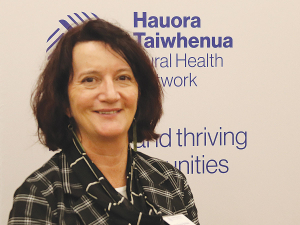Doctors and rural women welcome pre-Budget boost for urgent and after-hours care
Doctors and rural women are welcoming the recent pre-budget announcement from the Government that it would be boosting funding to urgent and afterhours care facilities.
 Hauora Taiwhenua chair Dr Fiona Bolden describes the decision not to offer pay parity to general practice nurses as a kick in the guts for rural nurses.
Hauora Taiwhenua chair Dr Fiona Bolden describes the decision not to offer pay parity to general practice nurses as a kick in the guts for rural nurses.
Another kick in the guts for rural nurses.
That’s how Dr Fiona Bolden – chair of Hauora Taiwhenua, which represents rural GPs – is describing Health Minister Andrew Little’s decision not to offer pay parity to nurses who work in general practice.
Bolden says on the one hand Little claims he is committed to pay parity with nurse in places such as aged care facilities, but she’s been advised that there is no plan to extend this to nurses who work in general practice.
Bolden says this is a totally devastating decision, not only for practice nurses, but also for the whole general practice team and the communities they serve. She says there is ample evidence of the disparity between pay for nurses in general practice and pay for nurses who work for DHBs.
“General practices, particularly in rural areas, are already struggling to meet the demands placed upon them. They were fundamental to the rollout of Covid vaccination programmes throughout NZ, and a significant factor in getting vaccinations to target rates for rural and rural Māori populations,” she explains.
“Yet for some reason the Minister, who in promoting the health reforms, stated that there was to be a major shift in emphasis towards primary and community care, has once again ignored those efforts,” she says.
Bolden says that, while Little says it is time to start addressing the pay rates of those health workers who don’t work for Te Whatu Ora, he also says that for GP nurses there is no “real evidence of pay difference at this point”.
“This will do nothing to address the continual drain of nurses from general practice to other more well paid and less demanding roles and to overseas jobs which are far more lucrative,” she adds.
hardworking, dedicated health professionals are the backbone of healthcare in the community, and they need recognition by at least being paid equitably to their DHB counterparts. She adds that small rural general practices and communityfunded rural hospitals do not have the financial flexibility to be able to increase their wages to the DHB equivalent.
“With the Christmas holidays coming up, we are still expected to keep general practices open and provide 24/7 care,” Bolden says. “We hope that we can help the Minister see how untenable this is without fair pay across the sector.”
New Zealand and Chile have signed a new arrangement designed to boost agricultural cooperation and drive sector success.
New DairyNZ research will help farmers mitigate the impacts of heat stress on herds in high-risk regions of the country.
Budou are being picked now in Bridge Pā, the most intense and exciting time of the year for the Greencollar team – and the harvest of the finest eating grapes is weeks earlier than expected.
The Real Estate Institute of New Zealand (REINZ) has released its latest rural property report, providing a detailed view of New Zealand’s rural real estate market for the 12 months ending December 2025.
Rural retailer Farmlands has released it's latest round of half-year results, labeling it as evidence that its five-year strategy is delivering on financial performance and better value for members.
OPINION: "We are back to where we were a year ago," according to a leading banking analyst in the UK, referring to US president Donald Trump's latest imposition of a global 10% tariff on all exports into the US.